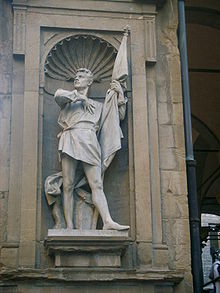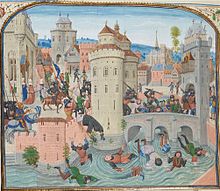
Information to change the world | |
Find Topics, Titles, Names related to your query |

Information to change the world | |
Find Topics, Titles, Names related to your query |
|
|
Popular revolt in late medieval Europe
|
Contents |
Before the 14th century, popular uprisings were not unknown (e.g., uprisings at a manor house against an unpleasant overlord), but they were local in scope. This changed in the 14th and 15th centuries when new downward pressures on the poor resulted in mass movements of popular uprisings across Europe. To provide an example of how common and widespread these movements became, in Germany between 1336 and 1525 there were no fewer than sixty instances of militant peasant unrest.[1]
Most of the revolts were an expression of those below who desired to share in the wealth, status, and well being of those more fortunate. In the end, they were almost always defeated and the nobles ruled the day. A new attitude emerged in Europe, that "peasant" was a pejorative concept, it was something separate, and seen in a negative light, from those who had wealth and status. This was an entirely new social stratification from earlier times when society had been based on the three orders, those who work, those who pray, and those who fight, when being a peasant meant being next to God, just as the other orders. Now peasants were seen as almost sub-human.

There were five main reasons for these mass uprisings including 1) an increasing gap between the wealthy and poor, 2) declining incomes of the wealthy, 3) rising inflation and taxation, 4) the external crises of famine, plague and war, and 5) religious backlashes.
The first reason was because the social gap between rich and poor had become more extreme[citation needed]. The origins of this change can be traced to the 12th century and the rise of the concept of nobility. Dress, behaviour, manners, courtesy, speech, diet, education – all became part of the noble class, making them distinct from others. By the 14th century the nobles had indeed become very different in their behaviour, appearance and values from those "beneath".
In urban centres, the early capitalist enterprises connected with long-distance trade and the textile industry had given rise to an urban underclass who were prone to riot in times when the price of bread was high. The perpetual apprentices who could not purchase a mastership in the tightly-controlled guilds were quick to express their resentment, and in university cities, students might be enlisted.
The second reason was a crisis for the nobles with declining income. By 1285 inflation had become rampant (in part due to population pressures)[citation needed] and some nobles charged rent based on customary fixed rates, based on the Feudal system, so as the price of goods and services rose (from inflation), the income of those nobles remained stagnant (effectively dropping). To make matters worse, the nobles had become accustomed to a more luxurious lifestyle that required more money. To address this, nobles illegally raised rents[citation needed], cheated, stole, and sometimes resorted to outright violence to take what they wanted.
Thirdly, kings needed money to finance wars and resorted to devaluing currency, by cutting silver and gold coins with less precious metal, which resulted in increased inflation and in the end, increased taxations[citation needed].
Fourth, the 14th century crisis of famine, plague and war put additional pressures on those at the bottom[citation needed]. The plague drastically reduced the numbers of people who were workers and producing the wealth.
Finally, layered on top of this was a popular ideological view of the time that property, wealth and inequality was against the teachings of God[citation needed], as expressed through the teachings of the Franciscans. The sentiment of the time was probably best expressed by preacher John Ball during the English Peasant Revolt when he said "When Adam delved and Eve span, who was then the gentleman?", criticising economic inequality as human-made rather than a creation of God.


Different historians will use different terms to describe these events.
The word peasant, since the 14th century (or even before), has a pejorative meaning and is not a neutral term. However, it was not always that way; peasants were once viewed as pious and seen with respect and pride. Life was hard for peasants, but life was hard for everyone. As nobles increasingly lived better quality lives, there arose a new consciousness of those on top and those on bottom, and the sense that being a peasant was not a position of equality. This new consciousness coincided with the popular uprisings of the 14th century.
Research by Rodney Hilton in the 1970s showed that the English Peasant Revolt of 1381[3] (or Great Rising) was led not by peasants, but by those who would be the most affected by increased taxation: the merchants who were neither wealthy, but not poor either. Indeed, these revolts were often accompanied by landless knights, excommunicated clerics and other members of society who might find gain or have reason to rebel. Although these were popular revolts, they were often organized and led by people who would not have considered themselves peasants.
Peasants is typically a term used for rural agrarian poor while many uprisings occurred within towns and cities by tradesmen, thus the term is not fully encompassing of events as a whole for the period.
For historical writing purposes, many modern historians will use the word peasant with care and respect, choosing other phrases such as "Popular" or "from below" or "grassroots", although in some countries in central and eastern Europe where serfdom continued up to the 19th century in places, the word peasant is still used by some historians as the main description of these events.
Related topics in the Connexions Subject Index
Alternatives –
Left History –
Libraries & Archives –
Social Change –
This article is based on one or more articles in Wikipedia, with modifications and additional content contributed by
Connexions editors. This article, and any information from Wikipedia, is covered by a
Creative Commons Attribution-Sharealike 3.0 Unported License (CC-BY-SA) and the
GNU Free Documentation
License (GFDL).
We welcome your help in improving and expanding the content of Connexipedia articles, and in correcting errors. Connexipedia is not a wiki: please contact Connexions by email if you wish to contribute. We are also looking for contributors interested in writing articles on topics, persons, events and organizations related to social justice and the history of social change movements.
For more information contact Connexions



